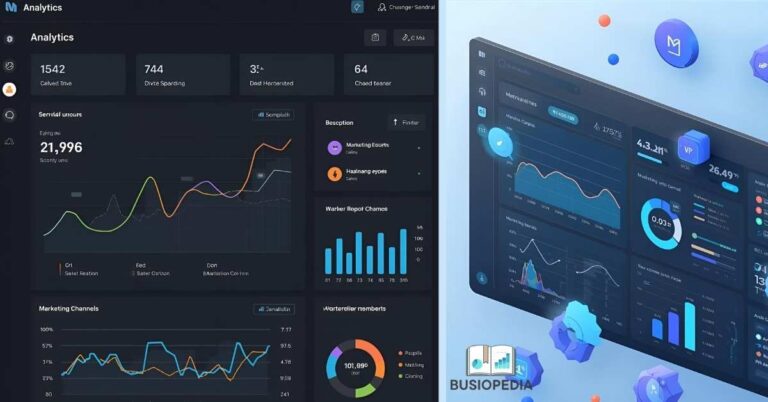Market Research And Its Importance: A Comprehensive Review
In today’s dynamic and intensely competitive business environment, understanding customer needs, evaluating market trends, and forecasting future competitive dynamics are essential for business success.
To understand the behaviors and trends of business industries, market research is one of the most effective tools for observing what is happening in the business world. Even when you want to introduce a new product or an international company that intends to grow into new markets, market research serves as a crucial step in making wise decisions.
In this article, we shall discuss what market research is, its types and methods, and, above all, why it is such a key component of business strategy and development.
Definition of Market Research?

Market research is the systematic collection, evaluation, and interpretation of data related to a specific market, providing valuable information regarding the target audience, the business’s competitors, industry trends, and consumer behaviors. It enables businesses to assess the viability of a product or service by evaluating various market factors, which also assist in forecasting potential industry movements.
The optimal objective of market research is to assist companies in making informed decisions. It answers very crucial questions, like:
- Who are my customers?
- What do they want?
- How much are they willing to pay?
- Who are my competitors in this industry?
What Are The Current Trends In The Industry For Target Audience?
By achieving answers to these questions, companies can minimise risk, disclose new opportunities for business growth, and adjust their strategies to customer needs and demands.
Types Of Market Research

Market research typically falls into two categories:
Primary Research
It entails gathering data directly from the source or target market. It is first-hand information gathered through
- Surveys and questionnaires
- Interviews (face-to-face or online)
- Focus groups
- Observations
Product Testing
Primary research is useful when companies need particular information or detailed insights into customer behavior, preferences, and motivations.
Secondary Research
Also referred to as desk research, secondary research is the process of examining data already gathered by other people. Sources include:
- Industry reports
- Market statistics
- Academic journals
- Government publications
- Company websites and case studies
Secondary research is inexpensive and an excellent place to start getting a handle on the general market environment.
Methods Of Market Research

The research employs various methods depending on its aim. Some of the most common methods are:
Quantitative Research
It is quantitative data and measures attitudes, opinions, and behavior. Examples:
- Online surveys
- Survey questions and responses
- Data analysis
Qualitative Research
It gives richer information about consumer motivations, wants, and behaviour. Examples:
- In-depth interviews
- Focus group conversations
- Ethnographic research
Competitive Analysis
Competitor study enables companies to realize market gaps, pricing, and positioning. It encompasses:
- SWOT analysis
- Benchmarking
- Industry trend analysis
Customer Satisfaction Research
This type of analysis is based on the satisfaction of customers with products or services, which improves quality and service.
Significance Of Market Research

We now possess knowledge about market research and its execution. Let’s examine how important it is.
Informed Decision Making
Market research offers data that minimizes guesswork. Decisions with strong research behind them have a greater chance of success, whether they are product introductions, marketing campaigns, or expansion into new markets.
Consumer Behavior
Tastes of consumers are constantly changing. Market research helps companies keep up with these changes through customer needs, tastes, and buying behaviors.
Opportunities and Threats
With market research, businesses are able to discover new markets to expand into, such as untapped markets or changes in customer needs. It simultaneously identifies threats to them, like new entrants or changing regulations.
Reducing Risk
Developing and introducing new products or venturing into new markets is risky. Market research reduces the risks because it verifies ideas prior to large investments. It informs you whether your audience is going to like your product or not.
Enhancing Products and Services
Feedback collected through customer surveys and market research enables companies to make adjustments to their products. They can enhance product details, enhance the level of service, or alter pricing strategies according to genuine customer feedback.
Strategic Planning
Business planning in the long term demands timely and accurate data. Strategic planning is facilitated by market research, which provides an explicit perception of market conditions, customer expectations, and industry trends.
Measuring Marketing Effectiveness
Market studies can guide what marketing channels, messages, or campaigns are most effective. Businesses can thus use their marketing budgets on effective strategies.
Competitive Advantage
Firms that engage in market research tend to be more agile and responsive. In understanding the market as well as the competition, they can devise better strategies and are likely to gain a competitive advantage.
Successful Market Research Examples In Real Life
- Apple Inc. is always trying to use market research in understanding what customers need and creating easy-to-use products. Its relentless innovation is founded squarely on the opinions of consumers and market studies.
- Netflix relies on viewer data to determine what shows or films to create. Its success as a content provider is heavily based on viewer research and their viewing behaviour.
- Coca-Cola combines primary and secondary research to learn about worldwide market trends and tailor products to fit the taste in various regions.
Conclusion
Market research is not only a weapon for large corporations, but it is also necessary for small and medium-sized companies. In an era with so many alternatives, so much noise, and so much competition, knowing the market environment is more crucial than ever before.
By adopting market research, companies obtain the clarity they require to make desired decisions, reduce risks, meet customers’ needs and wants, and lead the competition in the business industry.
By accepting time and resources for successful market research, companies are not only able to sidestep expensive mistakes but are also able to unearth new avenues to innovation, expansion, and long-term prosperity for the business.
Related articles:
- What You Should Know? Notes Payable And Accounts Payable
- Digital Marketing And Strategies: A Comprehensive Review with Practical Examples
- Fixed Index Annuities
- Are Annuities the Best Investment for a Bright Future? A Comprehensive Analysis
- Understanding Capital Expenditure: Definition, Significance, and Its Association in Financial Decision-Making
- Difference Between Accounting And Finance: A Proven Comprehensive Guide For Beginners
- Difference between Annuity due and Ordinary Annuity
- Essential Accounting Software for Small Enterprises







